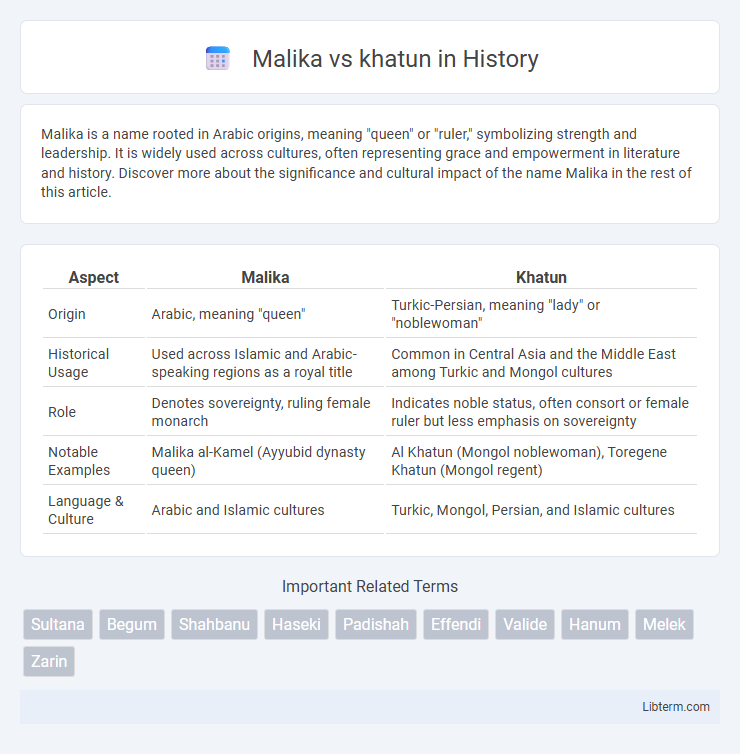Malika is a name rooted in Arabic origins, meaning "queen" or "ruler," symbolizing strength and leadership. It is widely used across cultures, often representing grace and empowerment in literature and history. Discover more about the significance and cultural impact of the name Malika in the rest of this article.
Table of Comparison
| Aspect | Malika | Khatun |
|---|---|---|
| Origin | Arabic, meaning "queen" | Turkic-Persian, meaning "lady" or "noblewoman" |
| Historical Usage | Used across Islamic and Arabic-speaking regions as a royal title | Common in Central Asia and the Middle East among Turkic and Mongol cultures |
| Role | Denotes sovereignty, ruling female monarch | Indicates noble status, often consort or female ruler but less emphasis on sovereignty |
| Notable Examples | Malika al-Kamel (Ayyubid dynasty queen) | Al Khatun (Mongol noblewoman), Toregene Khatun (Mongol regent) |
| Language & Culture | Arabic and Islamic cultures | Turkic, Mongol, Persian, and Islamic cultures |
Understanding the Terms: Malika vs Khatun
Malika and Khatun are titles used in different cultural and historical contexts to denote female nobility or rulership. Malika, derived from Arabic, specifically means "queen" and is commonly used in Arab and Islamic societies to refer to a sovereign female monarch. Khatun, of Turkic and Mongolic origin, signifies a noblewoman or queen, often used in Central Asian and Middle Eastern cultures to indicate a woman of high rank or authority.
Historical Origins of Malika and Khatun
Malika and Khatun both originate from titles used in Central and South Asian cultures to denote nobility and royal status. Malika, rooted in Arabic, means "queen" and emphasizes sovereign female authority in Islamic and Middle Eastern contexts. Khatun, derived from Turkic and Mongolic languages, historically referred to noblewomen or queens within Turkic and Mongol empires, reflecting a legacy of matriarchal influence in nomadic and imperial societies.
Etymology: What Do "Malika" and "Khatun" Mean?
Malika derives from the Arabic root "malik," meaning "queen" or "ruler," signifying sovereign authority in many Islamic cultures. Khatun originates from the Turkic-Mongolic term for "lady" or "noblewoman," historically used to denote aristocratic status in Central Asian and Middle Eastern societies. Both titles reflect gendered leadership and elite status, with Malika emphasizing royal governance and Khatun indicating noble lineage.
Usage in Different Cultures: Malika vs Khatun
Malika is a title meaning "queen" in Arabic, widely used across Middle Eastern and South Asian cultures to denote female royalty or nobility, symbolizing authority and leadership. Khatun, originating from Turkic and Mongolic languages, was historically employed among Central Asian and Middle Eastern nomadic societies as a noble title for women of high rank, often equivalent to queen or empress. Both titles reflect cultural distinctions in governance and social hierarchy, with Malika emphasizing royal power in Arab-influenced regions, while Khatun highlights matriarchal status within Turkic and Mongol traditions.
Hierarchical Distinctions: Queen, Empress, and Consort
Malika and Khatun represent distinct hierarchical titles with specific cultural and political connotations in Islamic and Turkic societies. Malika, often translated as Queen, denotes sovereign authority and ruling power within a kingdom or region, highlighting political autonomy and leadership. Khatun, historically used for noble consorts or empresses, signifies prestigious rank often associated with marriage alliances and influence within royal courts, emphasizing aristocratic status without direct sovereign rule.
Roles and Responsibilities: Malika vs Khatun
Malika, often recognized as a queen in South Asian and Middle Eastern contexts, holds roles that emphasize political authority, governance, and representation of the royal family. Khatun, a title used in Central Asian and Turkic cultures, typically signifies a noblewoman or empress with responsibilities concentrated on tribal leadership, social influence, and managing court affairs. Both titles reflect distinct cultural frameworks where Malika embodies sovereign power while Khatun integrates governance with matriarchal duties within nomadic and imperial traditions.
Famous Figures: Notable Malikas and Khatuns in History
Malikas and Khatuns have been prominent titles used for female rulers and noblewomen in South Asian and Central Asian history, associated with figures like Razia Sultana Malika, the first female Sultan of Delhi, and Sultana Khatun Begum, a notable Timurid princess. These titles signify power and leadership among women in Islamic and Turkic cultures, often denoting sovereignty or royal status. Their legacies highlight the influence of women in governance and the cultural interchange between Persian, Turkic, and South Asian dynasties.
Linguistic and Regional Variations
The terms "Malika" and "Khatun" both denote female nobility or queens, with "Malika" being Arabic in origin, commonly used across Middle Eastern and South Asian regions, while "Khatun" stems from Turkic and Mongolic languages, prevalent in Central and Western Asia. Linguistic variations influence the connotations and usage of these titles, where "Malika" emphasizes sovereignty within Islamic cultures, and "Khatun" historically signifies noble status among Turkic and Mongol tribes. Regional adaptations have integrated these titles into local dialects and cultural contexts, reflecting the diverse heritage of female rulership across Eurasian civilizations.
Symbolic and Social Significance
The titles Malika and Khatun hold deep symbolic and social significance within Islamic and Turkic cultures, representing female authority and noble status. Malika, derived from Arabic, symbolizes sovereignty and power associated with queenship, often invoking spiritual and political reverence. Khatun, rooted in Turkic and Mongol traditions, signifies respected noblewomen or empresses, embodying leadership and societal influence in historical patriarchal systems.
Modern Relevance and Contemporary Usage
The terms Malika and Khatun retain significant modern relevance in South Asian and Central Asian cultures, often used to denote female authority and respect in social and political contexts. Malika, meaning queen in Arabic and Urdu, is frequently adopted as a title for women in leadership, cultural events, and popular media, symbolizing empowerment and regality. Khatun, historically a Central Asian title for noblewomen, continues to appear in contemporary literature and cultural discourse, highlighting its enduring association with dignity and feminine strength.
Malika Infographic

 libterm.com
libterm.com